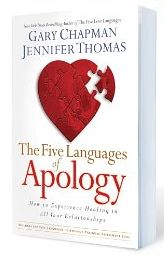
Nov 19, 2012
We’re heading into a season of human interaction.
The Thanksgiving Weekend – for those in the USA.
Christmas – New Year.
All year long we interact with others, but this time of year the interactions have overarching expectations. We’re supposed to be having fun, and bonding, and enjoying festivities.
We’re focused on being thankful – in all circumstances. W’e’re immersed in the holiness of the birth of Christ. We’re uniting with loved ones over meticulously prepared meals in thoughtfully decorated homes. We’re traveling. We’re giving and receiving packages purchased (or created) in a mad rush or stolen moments or proactively planned parcels of time.
All these interactions take energy. Expended energy creates tired people.
Tired people make mistakes.
Mistakes create tension.
Tension causes disagreements.
Disagreements begin less-than-positive interactions…
I’m guessing at some point in the next 2 months, you’re going to need to say…
“I’m sorry.”
How do you apologize? Effectively?
 A few weeks ago Robert and I had the pleasure of spending an evening with JT and Jennifer Thomas. They graciously invited us into their home and shared from their hearts some stories of their life.* What was the catalyst for this time together?
A few weeks ago Robert and I had the pleasure of spending an evening with JT and Jennifer Thomas. They graciously invited us into their home and shared from their hearts some stories of their life.* What was the catalyst for this time together?
Jennifer Thomas is the co-author of “The Five Languages of Apology”. When I wrote a post about this book on Leadership Couples, Jennifer reached out – and we took the opportunity to connect.
The Five Languages of Apology
This book answers both how to apologize – and why your apology may not be effective.
 Gary Chapman (author of “The Five Love Languages”) and Jennifer Thomas wrote this book after years of research. They present the five fundamental aspects of an apology as:
Gary Chapman (author of “The Five Love Languages”) and Jennifer Thomas wrote this book after years of research. They present the five fundamental aspects of an apology as:
- Expressing Regret. “I am sorry”
- Accepting Responsibility. “I was wrong.”
- Making Restitution. “What can I do to make it right?”
- Genuinely Repenting. “I’ll try not to do that again.”
- Requesting Forgiveness. “Will you please forgive me?”
In our conversation together, Jennifer shared that these fundamentals first grew from an interaction she and JT had over an issue. Jennifer apologized, but JT needed to hear more than an “I’m sorry.” He needed Jennifer to accept responsibility. He needed to hear the words, “I was wrong”.
The story of how the book progressed from an idea, to a possible article, into research and a co-authored book is found in the introduction. It’s a beautiful illustration of how sharing an idea can grow (after much work) into a powerful gift to benefit many people.
Who would benefit from this book?
The simple answer? Everyone who messes up.
Expressing regret, accepting responsibility, repenting, asking for forgiveness, and making a plan to do better in the future is key to every relationship. Spouse – parent – child – coworker – neighbor…
Husbands & Wives. “There are no healthy marriages without genuine apologies.” Sharing life with your spouse isn’t always champagne and roses – there are disagreements in a marriage. (Shocking, I know.) Is your apology accepted by your spouse? All through this book are illustrations of husbands and wives learning how to effectively apologize.
Parents. How do you teach your children to apologize? There’s a really great chapter walking parents through the process of teaching their children to: 1. Accept Responsibility for their Actions – 2. Learn How Their Actions Affect Others – 3. Understand there are Rules in Life – 4. How Apologies Restore Friendships – 5. How to Teach Children the Languages of Apology. I really like the statement toward the end of this chapter, “Young children do what parents say – older children do what parents do.” This way parents and children can learn the valuable skill of apology – together.
And then there are chapters for employers, employees, those dating, a personal profile inventory, and a group study guide. In the chapter about making restitution, illustrations are given to use your spouses’ love language as part of an apology.
Would you like to read this book?
We have a copy to give away…
Robert and I feel the concepts in this book are so valuable, we want to share it with you. If you’re interested, just leave a comment at the end of this post. You could even share your thoughts on what makes up an effective apology…
Next week – on Monday, November 26th – I’ll announce who won a copy of “The Five Languages of Apology”! (Then I’ll get Robert to mail it to you, ’cause he’s good at those “follow-through” things.)
*Robert is going to write a post about our time with Jennifer and JT Thomas. We’ll give another copy of this book away then. I’ll keep you posted so you have another chance to receive a free copy.
Don’t forget – leave a comment… 🙂


Nov 13, 2012
If I’m candid, I must admit that cooking is not on the top 10 list of things I like to do – so Robert loves it when we have company over for a meal.
Why?
We eat things we don’t normally eat –
- the fancy stuff
- the yummy, decadent desserts
- the nibbles and goodies of hors d’oeuvres
Sometimes I make special foods when it’s just Robert and me. I’ll choose the dishes that he loves like Chicken Divan and Lemon Souffle Pudding – recipes his mom makes and he’s loved since childhood. Those are easy and let him know I think he’s special. It’s my way of encouraging using food.
Fortunately, Robert isn’t picky. As much as he enjoys the fancy stuff, he gets excited over cheese and crackers, a hot dog, or Kraft Mac & Cheese. (yes, really)
Cooking can either be a chore that has to happen – or it can become a celebration of relationships.
Right now, with all 5 of us living in the house, we’re trying something new. (Alex and Alisane are buying a house – so they needed to move out of their apartment before the house was ready.) What’s new? On Thursday nights Sarah, Alex and Alisane take turns cooking for all of us!
We have a friend who is a chef, and last Thursday Alex and Alisane made Chicken Milanese from her cookbook! It was quick to make – and now has become a new family favorite!
It was such a great experience that I wrote a blog post for her site, “Cooking with Elise” about the experience. Click here to check it out!
It’s such a lovely feeling when those you love cook for you.
What recipes do you “go to” to make your spouse feel special?
Does your spouse cook for you?
Thanksgiving is coming in a bit more than a week – will you make something special for your spouse that reminds him or her of their childhood celebrations?
 Leave a comment on the blog post I did for Elise – and you’ll be entered into a drawing for a free signed copy of Elise’s new cookbook – “You Never Cook Alone” – she has lots of yummy recipes that could easily become your new family favorites!
Leave a comment on the blog post I did for Elise – and you’ll be entered into a drawing for a free signed copy of Elise’s new cookbook – “You Never Cook Alone” – she has lots of yummy recipes that could easily become your new family favorites!
Oct 22, 2012

Encouragement is like a glass of clear, clean, cold water – it refreshes.
What would you call the glass of dirty water with “floaties”?
(it’s not encouragement)
Which are you offering your spouse?

Inspire with Hope – Encouraging by looking forward with optimism.
Fortify with Faith – Encouraging by using your strong faith in God.
Foster with Love – Encouraging by loving without condition.
Uplift with Prayer – Encouraging by taking all your spouse’s concerns to God.
Support with Action – Encouraging by being that extra pair of hands to help.

Oct 4, 2012
The days can become hectic – disjointed – spastic – frazzled…
How can you and your spouse regroup – renew – recharge?
Take a break with your spouse – soak in some beauty:
Go for a walk.
Enjoy the beauty God has provided in nature.

Visit a museum or art gallery.
God has gifted some people with an amazing talent – appreciate the gift God has given.

An afternoon at the Mint Museum in Charlotte, NC – FREE fun!
Delight your taste-buds.
Indulge in a shared dessert and marvel at the gift of flavor.

our friend Chef Shannon’s dessert tray for her parents
You and your spouse are wonderfully made… enjoy!
Spend time pampering each other – hot water, lovely scents, the gift of touch…
Intimacy is a lovely gift from God.

Use your senses – soak in some beauty.
Give thanks – together – for all God has provided.
Sep 11, 2012
“Hearers interpret our questions and comments from their own perspective. Perhaps we should spend a bit more time encouraging and building confidence in others so they have the ability to see things from a “can do” approach.”
~ Dan Rockwell – Leadership Freak – from a comment on a blog post
(I kept the above quote in my stash of ideas and today was the perfect prompt for this post. You’ll find out from where this post started in a few paragraphs.)
Crafting our Questions
Our words have the power to build or destroy – and questions are no different.
Using Dan Rockwell’s point that “hearers interpret our questions and comments from their own perspective”, we need to be aware of our spouse’s perspective when sharing or questioning.
If your spouse has a naturally optimistic outlook, and hears your words from a positive perspective, the way you craft your questions remains important and will impact conversations, and you’re one step further down the road.
However, if your spouse wears a pessimistic outlook -or maybe they call it a realistic outlook – then how you craft your questions is vital.
An Illustration
This is a real conversation I overheard on Sunday with a 50-ish person and a University Student.
To start the conversation, the 50-ish person asked, “What’s your worst subject?”
Can you guess which direction the conversation went?
It quickly spiraled downward, with concerns about the content of the course, and the teacher. Then the conversation carried on with comments on the teacher’s country of origin, how the political system is impacting the state of education etc. etc. etc. To be candid, I stopped listening after a while. It was depressing.
Is this a blatant illustration? Yup. But it happened!
Imagine the direction the conversation could have gone if the 50-ish person had asked “What’s your best subject?” We could have left the conversation feeling empowered and uplifted. (Instead of the indignant emotion I’m still experiencing – hence this blog post!*)
Although this was just a short, passing conversation between friends, could it happen that a husband or wife would ask about a workday or experience using this kind of pronounced negativity? Hmm.
Before you ask…
Take Responsibility.

You know your spouse. You’ve lived together for a bit – or a bit longer than a bit. There’s every chance you have experience in how your spouse will respond to a conversational direction.
Before asking a question, use your intuition to sketch a possible path the conversation may take – anticipate. Will your question lead you both toward a place you want to dwell? Will this question lead you both to feel encouraged, confident and capable?
I want to be clear – this kind of analysis is not manipulation. It’s merely taking responsibility for our questions.
Being aware of our questions, and their outcomes, is one way to encourage, build confidence and foster the ability to see things from a “can do” approach.
Phrase your questions to:
- Look Forward. Pointing fingers, dwelling on blame and dissecting the past is part of a backward question like “What should we have done?” Instead of squinting backward – turn forward. Ask: “What can we do next time?” See Dan Rockwell’s post: “There are stupid questions.”
- Inspire. Dismantle the roadblocks. Ask questions to excite your spouse. Ask questions that’ll tickle their fancy, open their eyes to new possibilities, and touch that small part of every human that dreams of something more…
- Be Useful. Be succinct, and relevant. Asking useful questions usually includes topics that matter right now. Sometimes being useful is asking questions that bring scary answers – our job is to phrase the question in a way that makes “scary” lead to “able”.
How do you ask “can do” questions?
*Post Script: This 50-ish individual knows my focus on being positive and it’s quite possible the 50-ish person deliberately chose to start the conversation with our University Student friend this way just to push my buttons… It worked. (sigh)

 A few weeks ago Robert and I had the pleasure of spending an evening with JT and Jennifer Thomas. They graciously invited us into their home and shared from their hearts some stories of their life.* What was the catalyst for this time together?
A few weeks ago Robert and I had the pleasure of spending an evening with JT and Jennifer Thomas. They graciously invited us into their home and shared from their hearts some stories of their life.* What was the catalyst for this time together? Gary Chapman (author of “The Five Love Languages”) and Jennifer Thomas wrote this book after years of research. They present the five fundamental aspects of an apology as:
Gary Chapman (author of “The Five Love Languages”) and Jennifer Thomas wrote this book after years of research. They present the five fundamental aspects of an apology as:



















-01.png)

